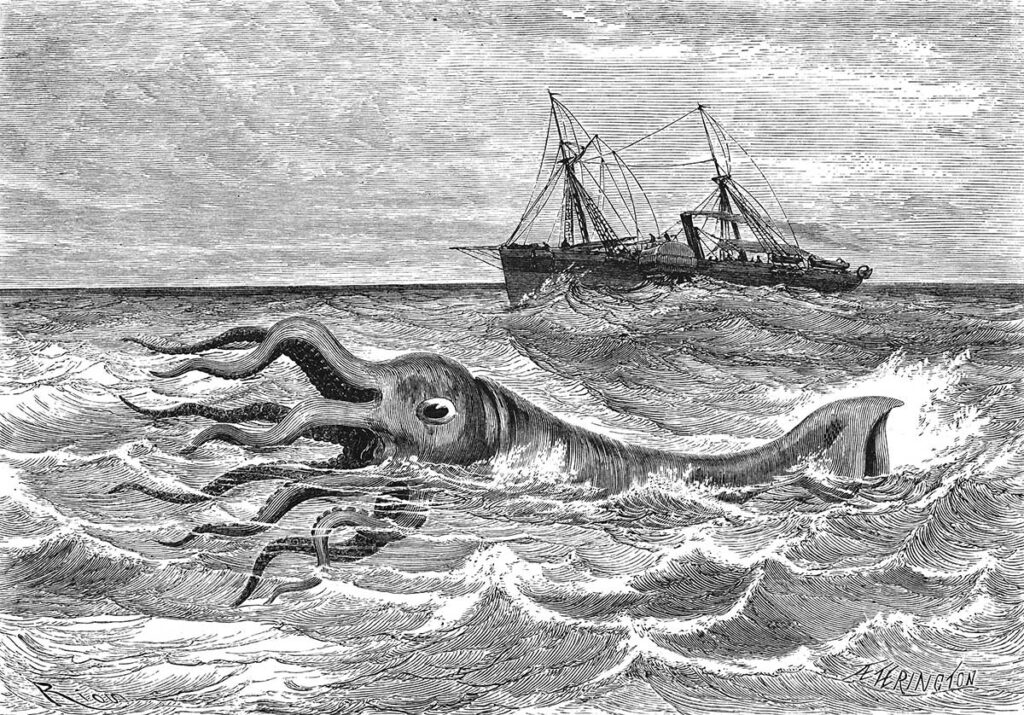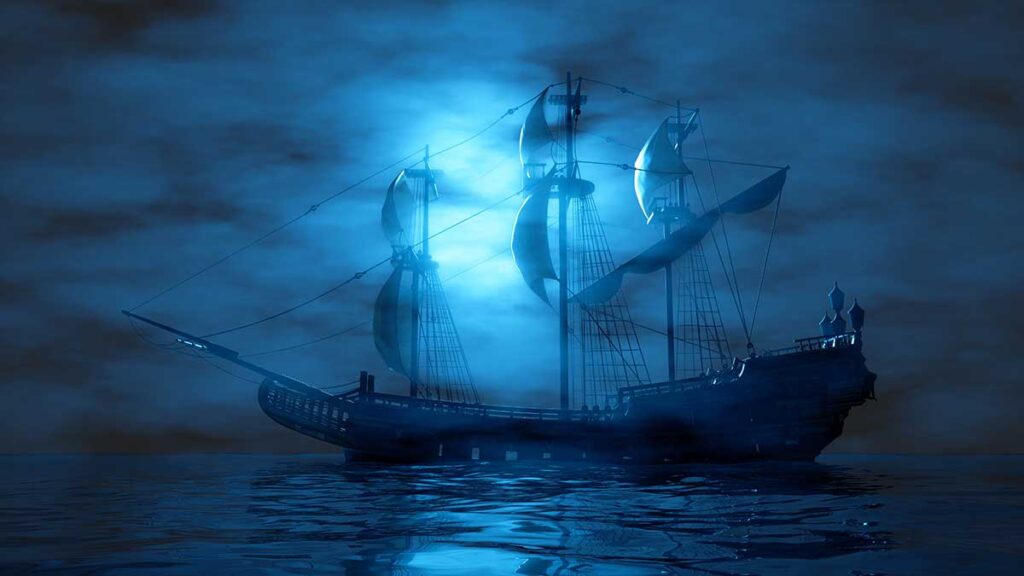Sea captains and sailors are a hearty and capable bunch. The type of strong-willed, can-do people you want in your corner when the going gets rough. But what’s up with all the myths and legends prevalent among nautical circles? Is it a little too much salt air?
For whatever reason, legends and myths have captivated sailors and fishermen for centuries. These are more than stories—they’re a thick thread of maritime culture. From ghostly ships to monstrous creatures, these tales carry warnings and wonder. There is also the oddball superstition that bringing bananas on a boat brings bad luck.
The Banana Curse: A Fruity Foe
I first experienced this quirky curse on a fishing charter in Miami with Capt. Bouncer Smith, who had a “No Bananas” sign displayed prominently on his boat. I thought it was a joke until my wife started storing our provisions on board before departure. The bananas were unceremoniously confiscated by the first mate and taken to a dockside trash bin – all the while muttering about curses. “No bananas on the boat!” he insisted.

A lot of us who don’t make our living on the sea might think this is funny. But for many captains and crew members, this is no laughing matter. The banana superstition is one of the most widely recognized nautical taboos, observed by anglers and charter captains alike.
So, where did this peculiar superstition come from?
This fruity curse likely originated in the 1700s, when vast amounts of tropical fruit were exported from the Caribbean to North America and Europe. The problem was that as bananas ripen, they release ethylene gas. This gas was causing other cargo within the ships to spoil. Even more dangerous was that some banana cargo could spoil to the point of fermentation. On rare occasions, the fermenting bananas produced an alcohol-laden slurry that was flammable.
To avoid spoilage, captains pushed their vessels to their limits, increasing the risk of shipwrecks. Another theory points to the creepy crawlies that hitched rides in banana crates—venomous spiders or snakes that could bite unsuspecting crew members, leading to illness or death. Over time, these practical dangers morphed into a broader superstition: bananas aboard meant storms, mechanical failures, or empty fishing nets.
Part of this lore could also be cultural. In some Caribbean folklore, bananas were linked to trickster spirits or bad omens. By the 1800s, the superstition was well-established and a fixture of seafaring lore.
To put a cap on my personal banana story, the entire day was full of mishaps. Our reels were constantly fouled with tangled lines. One time, the fishing line became entangled in the boat’s propeller, and we had to stop fishing to clear it from the engine. And the fish? Nowhere to be found. Was this all a coincidence? Probably. But with my fishing skills, I need all the luck I can muster. Next time, I’m leaving the bananas at home.
The Flying Dutchman Ghost Ship
Next is the legend of the Flying Dutchman. In this legend, a captain and his ghost ship are doomed to roam the seas forever, never to dock again. This myth has been around for centuries and is one of the better-known and ubiquitous stories among mariners. As the story goes, there is a captain who defied a storm’s wrath by cursing God. As punishment, the captain and his vessel were cursed to wander eternally without ever being able to dock again.
As with many of these stories, it likely originates from real ocean phenomena and the human imagination. One source is likely the occurrence of optical illusions possible on the ocean under certain conditions. Not unlike a mirage found in deserts, the sea can also produce mirages that create the appearance of ships in the distance where there are none. Add this phenomenon to the imagination of isolated and fatigued sailors, and they could likely mistake distance fogbanks or mirages for a phantom ship.
The Kraken
Next in our legend roundup is the kraken. You’ve probably even heard the saying, “release the kraken.” This story tells of a colossal sea monster capable of grabbing entire ships and pulling them down to the ocean floor.
This medieval tale appears to have Scandinavian origins. Stories of the kraken spread through medieval Europe, as sailors recounted encounters with massive, tentacled creatures rising from the deep ocean and tangling with their ships. There are also a few illustrations from the time depicting these creatures clutching ships.

At the time, many people easily dismissed these as tall tales. But again, modern science and technology have breathed new life into these stories with the discovery of giant squids. So, there could be some truth in these fantastic tales. The kraken’s enduring appeal lies in the fact that much of the ocean – to this day – is still unexplored. Also, another testament to the ocean’s untamed power.
Mermaids
Mermaids are supposedly half-human, half-fish creatures of nautical lore. These creatures are fabled to lure sailors to their deaths with enchanting songs. In maritime tradition, mermaids were often seen as omens—sometimes benevolent, sometimes deadly.
Sightings have often been attributed to weary sailors seeing manatees or dugongs in the distance or beneath the waves. Christopher Columbus himself reported seeing “mermaids” in 1493, though he noted they were “not as pretty as they are depicted.”
The mermaid myth persists as a reminder of the sea’s seductive and dangerous allure.
Why These Myths Endure
Like most myths and legends, the stories contain some grain of truth, but are also relics of our superstitious past. Each, in their own way, references the power of the ocean and the relative insignificance of a mariner at sea. The banana curse, rooted in practical risks, reminds us that minor oversights can lead to disaster at sea. The Flying Dutchman and kraken speak to the fear of the unknown, while mermaids capture the sea’s beauty and terror. Each tale carries a lesson: respect the ocean, for it holds secrets we may never fully grasp. The next time you’re setting off to sea, you may want to consider leaving the bananas at home.

